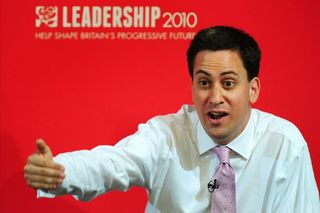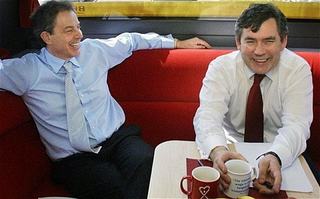
His stump speech was framed in terms of the familiar nostrums. He ably ticked all the boxes: politics can make a difference ... politics should be about more than management ... Labour needs to listen more ... the leadership election provides us with a blank page ... etc.
Ed said Labour did some things in government we should be proud of, but it didn't do enough. On the economy, he believed the party came too late to the idea of having an industrial policy. The experience of government had taught them markets alone cannot be left to create jobs because it never will in sufficient quantities, therefore the state has the responsibility to fill this gap. He also knew millions of working class people were turned off from Labour because of its chummy relationship with business. Ed acknowledged this was a less a relationship and more a case of business's lording it over the party. In a New Labourish rehtorical flourish, he said if workers can expect fairness not favours from Labour, then it should be the same for business.
Warming to his theme, he thought New Labour was an overreaction to the 1980s. The managerial style, the centralised leadership under Blair and Brown, it was all top down. The new leadership must learn to listen to its members to avoid the heavy handed mistakes of the ancien regime. This means a proper party conference with serious debate, members' input into policy making, and the inculcation of a sense that members have influence on the party's direction. Part and parcel of this is rebuilding of the trade union movement. He said he was proud to be nominated by so many unions, but thought it was a real tragedy not enough people were in them. If he was voted leader he would work with the rest of the labour movement to make them more relevant.
The meeting then moved to questions. I won't bore readers with the ins and outs of every query, but will stick to the main points.
On the coalition, he said when the Tories are in government, they behave as if they own the place. When Labour are in, they feel like squatters. But the situation now is different to the 80s. Back then Labour were relatively powerless to stop the Tories. But because Cameron governs in coalition, the LibDems are particularly vulnerable. Our job is to make them feel like an endangered species. They've got to feel as if deposing Nick Clegg is the only way to save themselves from electoral oblivion. If we are successful in keeping up this pressure, the coalition will fall.
On parliamentary selection (obviously a controversial issue in Stoke), because it demotivates members and can drive them out of the party, he was asked if he would give an undertaking to stop the imposition of candidates by the central party? Ed replied the impositions happened because the 'special rule' period had been applied for longer than usual. To avoid this happening again, CLPs need to select their candidates earlier. If MPs are going to step down, they owe their CLPs the courtesy to give them plenty of time to organise a selection process.
On the deficit, the questioner felt the Tories had enjoyed a free ride at the despatch box and they were using the debt to railroad though an ideologically-driven cuts agenda. Ed replied that when the Tories have completed their spending review in the autumn we have to be ready with an alternative to their draconian cuts. We have to challenge them on their rewrite of history: this was a crisis of the banking sector and not the public sector.
On foreign policy, though he avoided direct discussion of Iraq, Ed said that under Blair New Labour mistook the alliance with the USA as the need to agree with Bush's on everything. Britain needs to disagree with America when necessary, and also be more willing to criticise Israel for its actions (in fact, he went as far to say Britain and the EU should not upgrade its relations with Israel (whatever that means) until it has made real progress on Gaza).
As a trade unionist I was particularly interested to hear his opinions on workplace rights. I got the impression from elsewhere that Ed more or less supported the status quo. If he did hold this position, then he's recently moved on it. He believed all industrial legislation needs to be reviewed: he thought the labyrinthine rules on strike ballots were utterly absurd. He was also for union access to workplaces as of right, a strengthening of rules on unfair dismissal and redundancy, and get away from how the rest of the world views Britain: as a country that hires and fires in cavalier fashion.
Lastly, Trotskyist readers of a certain pedigree might be interested to learn Ed was fully in favour of Young Labour having more independence and the right to take its own positions on things. This is necessary if we are to build a culture where the party can trust itself, and a movement fully in touch with the concerns and struggles outside of parliament.
This meeting pleasantly surprised me. In contrast to gloomy comment on other blogs, I thought Ed Miliband's stall was solidly labourist. For example, whereas Ed Balls combines a Keynesian orientation to the economy with a near-Powellite view on immigration, Ed Miliband eloquently argued that immigration was a lightning rod for discontent. An economic programme that places jobs and house building at the core of a coherent industrial strategy would undermine the antipathy large sections of Labour voters feel toward immigrant workers. Sure, it's not the solidly socialist programme some demand as the condition for taking out Labour membership, but it's a clear social democratic break with the Third Way/neoliberal claptrap that went before.
Speaking to various folk afterwards, more than a few members said it reaffirmed their decisions to back Ed. It's fair to say he picked up some converts too. Speaking to a local leading trade unionist, he said if Ed Miliband won his (sizable) branch would join the party en masse. Of course, they should join now to help make sure he does. And again, the atmosphere was convivial, friendly, and there was plenty of time after for socialising.
Whether one supports him or not, if Ed Miliband wins the leadership contest Labour will be a more interesting, more gratifying place to be. Why not come aboard?




